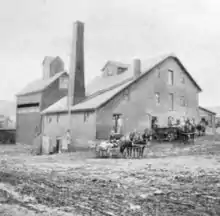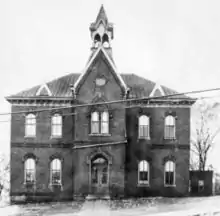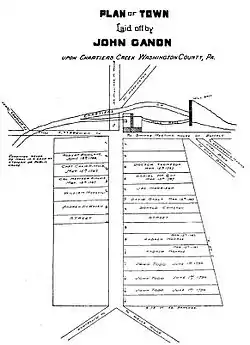John Canon
John Canon (generally referred to as Colonel John Canon[1]) (September 11th 1726 – November 6, 1798) was an American Revolutionary soldier, miller, judge, and businessman, who founded three towns, including Canonsburg, Pennsylvania, which bears his name.
John Canon | |
|---|---|
| Born | September 11th 1726 |
| Died | November 6, 1798 (aged 72) |
| Known for | Founder of Canonsburg, Pennsylvania |
Early history

John Canon was one of the first settlers in Chartiers Valley, a tributary of the Ohio River. He worked as a rent collector for George Washington, who owned a large amount of land in the area.[2] At the time, the area was part of Virginia.[1] In 1773, Canon acquired 12 acres (4.9 ha) of land along the Chartiers Creek on the Catfish Path, where he built a gristmill and started a farm.[3] In January 1774, he was appointed viewer of a road from Thomas Gist's in Mount Braddock to Paul Froman's mill on Chartiers Creek.[1] He was appointed by Lord Dunmore to serve as judge in Augusta County. After the border dispute between Pennsylvania and Virginia, the area was placed in Yohogania County.[1]
Military service
In 1775, he was named a colonel in the Washington County militia during the American Revolutionary War.[1] He was made sub-lieutenant of the county and participated in a number of Indian expeditions, including the Crawford expeditions.[1] It is not clear whether he participated in some of the more brutal raids, as is claimed by some historical accounts.[1] Some evidence exists that indicate that he was in Philadelphia, serving in the Pennsylvania Provincial Assembly.[1]
Civic accomplishments

In 1780, he received land in Virginia along the Chartiers Valley through present-day Canonsburg on the north side of Chartiers Creek. In that land, he founded three towns, "Canon Hill" (now Canonsburg, founded April 15, 1788[3]), "Abbington," and "Sugar-Tree Grove."[1] He owned an early flour mill and saw mill that formed the basis of the town.[4] It was water-powered and was erected in 1780.[4][5] The mill was demolished in 1942 when the milling company ceased flour production.[5]
He was a member of the Board of Trustees of Washington Academy, an academy that would eventually merge with the institution he helped found, from 1789 until his death in 1798.[6] In 1791, he helped found Canonsburg Academy, which would later become Jefferson College and Washington & Jefferson College, by donating a plot of land in Canonsburg and constructing the Stone Academy Building.[1][5]
Personal life
Canon had five children, Abigail, William, Jane, Joshua, and John, Jr., by his first wife and three children, Samuel, Margaret, and Ann, by his second wife.[1] He died on November 6, 1798.
Gallery
 Canonsburg, as laid out by Col. Canon
Canonsburg, as laid out by Col. Canon
References
- Crumrine, Boyd (1882). "Canonsburg Borough". History of Washington County, Pennsylvania with Biographical Sketches of Many of Its Pioneers and Prominent Men. Philadelphia: L. H. Leverts & Co. pp. 601–627.
- Gordon, Gertrude (June 26, 1911). "Canonsburg Is Rich in Lore of the 18th Century". The Pittsburgh Press.
- Switala, William J. (2001). Underground railroad in Pennsylvania. Stackpole Books. ISBN 0-8117-1629-5. pp. 78-79.
- "History of Canonsburg". Canonsburg, Pennsylvania.
- "Canonsburg's Historical Markers - John Canon's Mill". Canonsburg, Pennsylvania. Archived from the original on 2012-08-13.
- Coleman, Helen Turnbull Waite (1956). Banners in the Wilderness: The Early Years of Washington and Jefferson College. University of Pittsburgh Press. p. 47. OCLC 2191890.